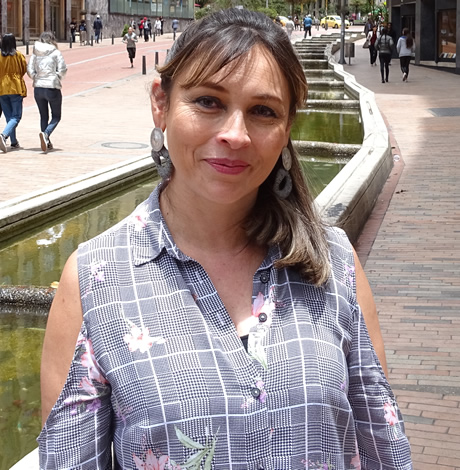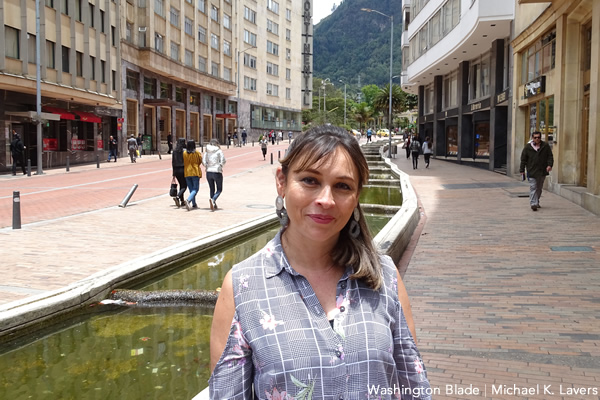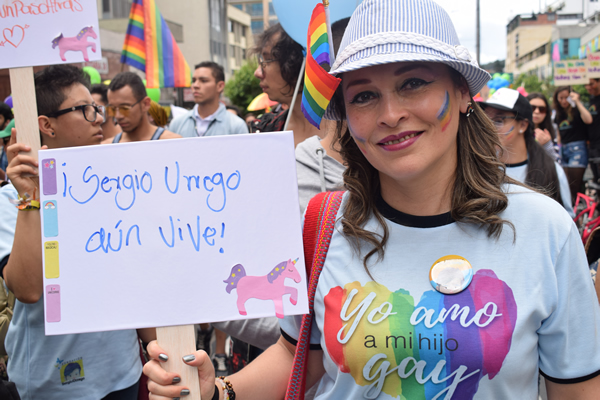News
Madre de Sergio Urrego lucha contra el bullying en Colombia
Alba Lucía Reyes Arenas se convirtió en una activista vocal


Alba Lucía Reyes Arenas en Bogotá, Colombia, el 24 de septiembre de 2018. Su hijo, Sergio Urrego, se suicidó en 2014 después de ser víctima del bullying homofóbico por parte de la administración de su colegio en la capital colombiana. (Foto del Washington Blade por Michael K. Lavers)
Ella dijo al Washington Blade el 24 de septiembre durante una entrevista en la capital colombiana de Bogotá que le gustaba la opera desde era “bien joven” y leyó su primer libro, “Historias sin fin,” cuando tenía seis años. Reyes dijo que su hijo era ateo y le gustaba el arte y las políticas.
Urrego también era miembro de un grupo de estudiantes anarquistas.
“Tengo muchas cosas que contarte,” dijo Reyes. “Para todas las mamás, nuestros hijos son muy especiales, pero Sergio si es desde era una personita si se interesaba por las cosas que son eran más de su edad.”
Urrego tenía 16 años cuando se suicidó el 4 de agosto de 2014.
Administradores y un psicólogo al colegio católico de Urrego en Bogotá lo atacaron después de que un maestro vio una foto de él besando a su novio en su móvil.
Los padres del novio de Urrego le acusaron de abusar sexualmente a su hijo. Urrego debía haber comenzado a asistir otro colegio el día después de su suicidio.
La muerte del hijo ‘fue algo angustiaste’
Reyes estaba en la ciudad colombiana de Cali cuando supo por primera vez que algo andaba mal con su hijo.
Ella regresó a Bogotá y llegó a su hogar alrededor de las 9:30 p.m. Reyes dijo entre lágrimas que la primera cosa que encontró era una nota con “letra muy grande” de su hijo.
Reyes dijo que al principio pensó que se lo había dejado a su madre, pero fue por ella. Reyes dijo al Blade que su hijo escribió, “Yo no podía ir al colegio porque se me presento un problema.”
“Cuando yo vi esta nota, yo dije algo pasó,” ella dijo.
Reyes dijo que luego fue al dormitorio de su hijo y encontró libros en su cama y una nota que le pedía que se los diera a sus mejores amigos. Reyes también encontró otras notas que su hijo había escrito antes de su suicidio.
“Fue algo angustiaste,” ella dijo. “Fue doloroso.”
Ley colombiana ahora prohíbe discriminación homofóbica en escuelas
La muerte de Urrego provocó indignación entre los activistas LGBTI en Colombia.
Reyes el 11 de septiembre de 2014 presentó una tutela contra del colegio de Urrego.
Un tribunal en Bogotá, unas semanas después, falló que Urrego había sido víctima de discriminación, pero Reyes no recibió ningún daño y el fallo no ordenó al Ministerio de Educación de Colombia que revisará las políticas del colegio.
Reyes apeló el fallo ante el Consejo de Estado, que considera las apelaciones de los tribunales administrativos. El entonces Procurador Alejandro Ordóñez — un oponente vocal de los derechos LGBTI que el presidente Iván Duque el pasado mes nombró como el nuevo embajador colombiana ante la Organización de Estados Unidos — falló en contra de Reyes basándose en que las escuelas tenían el derecho de prohibir “los besos y los abrazos.”
La rectora del colegio, Amanda Azucena Castillo, renunció el 10 de octubre de 2014. La Corte Constitucional de Colombia el 21 de agosto de 2015 revocó la decisión del Consejo de Estado y falló a favor de Reyes el 11 de diciembre de 2015.
Escuelas en Colombia no pueden discriminar en contra de sus estudiantes por razón de su orientación sexual. Una enmienda a la ley de no discriminación que incluye el nombre de Urrego también requiere que las escuelas colombianas actualicen sus políticas para garantizar que no sean discriminatorias contra la comunidad LGBTI.
‘Siempre me acompaña’
Reyes desde la muerte de su hijo se ha convertido en una activista vocal contra el bullying.
Ella estaba entre los 31 activistas LGBTI desde todo el mundo que asistió una cumbre del Human Rights Campaign que se realizó en Washington en abril.
Reyes en mayo viajó a Cuba para participar en eventos del Día Internacional contra la Homofobia, la Transfobia y la Bifobia que fueron organizados por el Centro Nacional de Educación Sexual (CENESEX). Mariela Castro, la directora del CENESEX que es la hija del expresidente cubano Raúl Castro, invitó a Reyes de participar en un taller a la sede del CENESEX en La Habana.
Reyes este año lanzó oficialmente la Fundación Sergio Urrego, que busca poner el fin a la discriminación en las escuelas colombianas y evitar el suicidio entre ellos que sufren la discriminación.
El dijo al Blade que el suicidio es la segunda causa de muerte en “nuestros jóvenes.” Reyes también notó estadísticas que indican 192 personas entre las edades de 15 y 24 en Bogotá se suicidaron este año.
“Es algo que aquí no se toca,” ella dijo. “No hay una institución que se brindando atención inmediatamente a los niños que están en crisis.”
La fundación ha respondido a casi 70 casos. También tiene talleres para niños y padres en empresas y en otros lugares por el país.
“Mi propósito es evitar que casos como los de Sergio de se sucede,” dijo Reyes.
Reyes en julio habló a un concierto en la Plaza Bolívar de Bogotá durante las celebraciones del Orgullo de la ciudad. Se terminó el 25 de septiembre una campaña de los medios sociales de la fundación con el hashtag “Celebro soy yo” que buscaba dar recursos y seguridad para aquellos que sufren discriminación.
“Esa campaña me da fuerza para continuar, para seguir,” dijo Reyes. “Ese tipo de campaña se ayudan. Ese tipo de campaña llegan al corazón de la gente.”

Alba Reyes participa en una marcha del Orgullo en Bogotá, Colombia, el 1 de julio de 2018. (Foto cortesía de Fundación Sergio Urrego.)
Reyes terminó la entrevista por decir que su hijo sería orgulloso de ella y del trabajo que hace en su nombre.
“Sea un angelito,” ella dijo. “Siempre me acompaña.”
National
Supreme Court deals blow to trans student privacy protections
Under this ruling, parents are entitled to be informed about their children’s gender identity at school, regardless of state protections for student privacy.

The Supreme Court on Monday blocked a California policy that allowed teachers to withhold information about a student’s gender identity from their parents.
The policy had permitted California students to explore their gender identity at school without that information automatically being disclosed to their parents. Now, educators in the state will be required to inform parents about developments related to a student’s gender identity, depending on how the case proceeds in lower courts.
The case involves two sets of parents — identified in court filings as John and Jane Poe and John and Jane Doe — both of which say their daughters began identifying as boys at school without their knowledge, citing religious objections to gender transitioning.
The Poes say they only learned about their daughter’s gender dysphoria after she attempted suicide in eighth grade and was hospitalized. After treatment for the attempt and after being returned to school the following year, teachers continued using a male name and pronouns despite the parents’ objections, citing California law. The Poes have since placed their daughter in therapy and psychiatric care.
Similarly, the Does say their daughter has intermittently identified as a boy since fifth grade, but while their daughter was in seventh grade, they confronted school administrators over concerns that staff were using a male name and pronouns without informing them. The principal told them state law barred disclosure without the child’s consent.
Both sets of parents filed lawsuits in the U.S. District Court for the Southern District of California challenging the state policy that protects students’ gender identity and limits when schools can disclose that information to parents.
The justices voted along ideological lines, with the court’s six conservative members in the majority and the three liberal justices dissenting.
“We conclude that the parents who seek religious exemptions are likely to succeed on the merits of their Free Exercise Clause claim,” the court said in an unsigned order. “The parents who assert a free exercise claim have sincere religious beliefs about sex and gender, and they feel a religious obligation to raise their children in accordance with those beliefs. California’s policies violate those beliefs.”
In dissent, the three liberal justices argued that the case is still working its way through the lower courts and that there was no need for the high court to intervene at this stage. Justice Elena Kagan wrote, “If nothing else, this Court owes it to a sovereign State to avoid throwing over its policies in a slapdash way, if the Court can provide normal procedures. And throwing over a State’s policy is what the Court does today.”
Conservative Justices Samuel Alito and Clarence Thomas indicated they would have gone further and granted broader relief to the parents and teachers challenging the policy.
The emergency appeal from a group of teachers and parents in California followed a decision from the United States Court of Appeals for the Ninth Circuit that allowed the state’s policy to remain in effect. The appeals court had paused an order from U.S. District Judge Roger Benitez — who was nominated by George W. Bush — that sided with the parents and teachers and put the policy on hold.
The legal challenge was backed by the Thomas More Society, which relied heavily on a decision last year in which the court’s conservative majority sided with a group of religious parents seeking to opt their elementary school children out of engaging with LGBTQ-themed books in the classroom.
California Attorney General Rob Bonta expressed disappointment with the ruling. “We remain committed to ensuring a safe, welcoming school environment for all students while respecting the crucial role parents play in students’ lives,” his office said in a statement.
The decision comes as the Trump administration has taken a hardline approach to transgender rights. During his State of the Union address last week, President Donald Trump referenced Sage Blair, who previously identified as transgender and later detransitioned, describing Blair’s experience transitioning in a public school. According to the president, school employees supported Blair’s chosen gender identity and did not initially inform Blair’s parents.

Last year, the court upheld Tennessee’s ban on gender-affirming medical care for transgender minors and has allowed enforcement of a policy barring transgender people from serving in the military to continue during Trump’s second term.
District of Columbia
D.C. Black Pride theme, performers announced at ‘Speakeasy’
Durand Bernarr to headline 2026 programming

The Center for Black Equity held its 2026 DC Black Pride Theme Reveal event at Union Stage on Monday. The evening, a “Speakeasy Happy Hour,” was hosted by Anthony Oakes and featured performances by Lolita Leopard and Keith Angelo. The Center for Black Equity organizes DC Black Pride.
Kenya Hutton, Center for Black Equity president and CEO, spoke following the performances by Leopard and Angelo. Hutton announced this year’s theme for DC Black Pride: “New Black Renaissance.”
Performers for 2026 DC Black Pride were announced to be Bang Garcon, Be Steadwell, Jay Columbus, Bennu Byrd, Rue Pratt and Akeem Woods.
Singer-songwriter Durand Bernarr was announced as the headliner for the 2026 festivities. Bernerr gave brief remarks through a video played on the screen at the stage.
DC Black Pride is scheduled for May 22-25. For more information on DC Black Pride, visit dcblackpride.org.
Virginia
Arlington LGBTQ bar Freddie’s celebrates 25th anniversary
Owner asks public to support D.C.-area gay bars

An overflowing crowd turned out Sunday night, March 1, for the 25th anniversary celebration of Freddie’s Beach Bar, the LGBTQ bar and restaurant located in the Crystal City section of Arlington, Va.
The celebration began as longtime patrons sitting at tables and at the bar ordered drinks, snacks, and full meals as several of Freddie’s well-known drag queens performed on a decorated stage.
Roland Watkins, an official with Equality NoVa, an LGBTQ advocacy organization based in the Northern Virginia areas of Arlington, Alexandria, and Fairfax County, next told the gathering about the history of Freddie’s Beach Bar and the role he said that owner Freddie Lutz has played in broadening the bar’s role into a community gathering place.
“Twenty-five years ago, opening a gay bar in Arlington was not a given,” Watkins told the crowd from the stage. “It took courage, convincing, and a deep belief that our community belongs openly, visibly, and proudly,” he said. “And that belief came from Freddie.”
Watkins and others familiar with Freddie’s noted that under Lutz’s leadership and support from his staff, Freddie’s provided support and a gathering place for LGBTQ organizations and a place where Virginia elected officials, and candidates running for public office, came to express their support for the LGBTQ community.
“Over the past 25 years, Freddie’s has become more than a bar,” Watkins said. “It has become a community maker.”
Lutz, who spoke next, said he was moved by the outpouring of support from long-time customers. “Thank you all so much for coming tonight and thank you all so much for your support over the past 25 years,” he said. “I can’t tell you how much that means to me and how much it’s kept me going.”
But Lutz then said Freddie’s, like many other D.C. area gay bars, continues to face economic hard times that he said began during the COVID pandemic. He noted that fewer customers are coming to Freddie’s in recent years, with a significant drop in patronage for his once lucrative weekend buffet brunches.
“So, I don’t want to be the daddy downer on my 25-year anniversary,” he said. “But this was actually the worst year we’ve ever had,” he added. “And I guess what I’m asking is please help us out. Not just me, but all the gay bars in the area.” He added, “I’m reaching out and I’m appealing to you not to forget the gay bars.”
Lutz received loud, prolonged applause, with many customers hugging him as he walked off the stage.
-

 India5 days ago
India5 days agoActivists push for better counting of transgender Indians in 2026 Census
-

 Advice5 days ago
Advice5 days agoDry January has isolated me from my friends
-

 National5 days ago
National5 days agoAfter layoffs at Advocate, parent company acquires ‘Them’ from Conde Nast
-

 District of Columbia5 days ago
District of Columbia5 days agoCapital Pride reveals 2026 theme


















